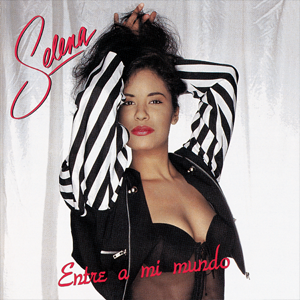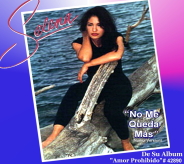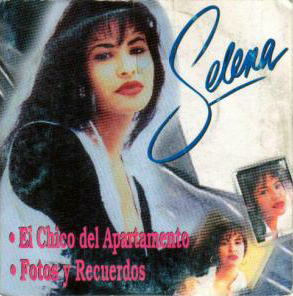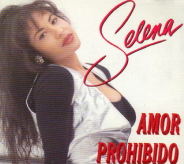Related Research Articles

Amor Prohibido is the fourth studio album by American singer Selena, released on March 22, 1994, by EMI Latin. Having reached a core fan base, the label aimed to broaden her appeal with the next studio release. Finding it challenging to write a follow-up hit after "Como la Flor" (1992), Selena's brother A. B. Quintanilla enlisted the assistance from band members Ricky Vela and Pete Astudillo with writing the album's songs. The resulting album has a more mature sound featuring experimental production that blends diverse musical styles from ranchera to hip-hop music. Amor Prohibido is a Tejano cumbia album modernized with a synthesizer-rich delivery using a minimalist style that was quintessential in early 1990s Tejano music.

Ven Conmigo is the second studio album by American singer Selena, released on November 12, 1990, by EMI Latin. The singer's brother, A.B. Quintanilla III remained her principal record producer and songwriter after her debut album's moderate success. Selena's Los Dinos band composed and arranged seven of the album's ten tracks; local songwriter Johnny Herrera also provided songs for Selena to record. Ven Conmigo contains half cumbias and half rancheras, though the album includes other genres. Its musical compositions are varied and demonstrate an evolving maturity in Selena's basic Tejano sound. The album's structure and track organization were unconventional compared with other Tejano music albums. The songs on Ven Conmigo are mostly love songs or songs following a woman's struggles after many failed relationships.

Entre a Mi Mundo is the third studio album by American singer Selena, released on May 6, 1992, by EMI Latin. The label endeavored to bolster Selena's popularity within the Latin music market in the United States with this release. Selena's brother, A. B. Quintanilla kept his role as the singer's producer and, in collaboration with Selena y Los Dinos members Pete Astudillo and Ricky Vela, composed tracks for the album. The ensuing recording encompassed an eclectic array of songs, attributable to the members' diverse backgrounds, which facilitated the modernization of the many genres they explored. Entre a Mi Mundo is a Tejano cumbia album that encapsulated Selena's quintessential sound, characterized by engaging tunes harmonized with her distinctive, plaintive vocals and a relaxed, danceable cumbia beat. The album incorporates musical inspirations from power pop, R&B, disco, rock, funk, and synthesized Tejano music.

Live! or Selena Live! is a live album by American Tejano pop singer Selena, which was released on May 4, 1993, by EMI Latin. The album was re-released on September 22, 2002, as being part of the Selena: 20 Years of Music collection; which included spoken liner notes by her family, friends and her former band members Selena y Los Dinos. Live! includes three cumbia-influenced studio tracks, while the rest of the album consists of live versions of previously released songs. The album was recorded during a free concert at the Memorial Coliseum in Corpus Christi, Texas, on February 7, 1993. It was certified gold by the Recording Industry Association of America in its first year, double platinum in 1995, and 8× platinum in 2017.

Alpha is the second independent studio album by American Tejano music group Selena y Los Dinos. Released on June 11, 1986 under Manny Guerra's G.P. Productions, it followed the group’s debut album, which was recorded under Freddie Records. Selena y Los Dinos, led by vocalist Selena, recorded mostly cover songs. Wanting to stand out, bassist A.B. Quintanilla requested original material from Luis Silva after noticing his track record for writing award-winning songs. Silva ignored A.B.'s request and he was inspired by Abraham to write songs himself. The group expanded to include keyboardist Ricky Vela and guitarist Roger Garcia. Vela collaborated with A.B. on "Dame un Beso", while he collaborated with Abraham on "Dame Tu Amor". A.B. became Selena y Los Dinos' music producer and songwriter, while Abraham encouraged them to record songs of various genres to appeal to a wider audience. Despite her limited Spanish, Selena recorded all nine tracks phonetically.

Anthology is the first box set by American singer Selena. It was released posthumously on April 7, 1998, through EMI Latin to commemorate the singer's works. The collection comprises 30 tracks, dispersed across three genre-themed discs: "Pop / English" showcases uptempo pop compositions, "Mariachi" highlights Mexican ballads featuring poignant narratives of heartache, and "Cumbia" presents danceable tropical rhythms. The album encompasses recordings from a 14-year-old Selena on her Alpha (1986) album to the posthumous "Disco Medley" (1997). With a limited number of unaltered tracks, Anthology predominantly features reworked and remastered musical arrangements, while preserving the singer's original vocals. Selena's death in March 1995 prompted an influx of requests from her admirers. The singer's father and manager, Abraham Quintanilla, expressed a desire to maintain his daughter's legacy through her music. However, Selena's family has faced criticism from both fans and the media, who accuse them of capitalizing on her death and commodifying her repertoire.

All My Hits: Todos Mis Éxitos Vol. 2 is a greatest hits album by American singer Selena that was released on February 29, 2000, through EMI Latin. After Selena's murder in 1995, her father Abraham Quintanilla stated his commitment to preserving her music and EMI Latin pledged ongoing support for her releases. In 1999, the label's president José Behar acknowledged Selena, who remained the label's top-selling artist, for her contributions to establishing EMI Latin as "the house that Selena built". In March 1999, to commemorate the label's tenth anniversary, it released All My Hits: Todos Mis Éxitos; it achieved commercial success and a sequel was announced. All My Hits: Todos Mis Éxitos Vol. 2 contains 16 songs ranging from tracks featured on Selena's Muñequito de Trapo (1987) to the posthumous 1997 club remix of "Enamorada de Ti" (1990).

Momentos Intimos is a compilation album by American singer Selena and released posthumously on March 23, 2004, through EMI Latin. The album contains 24 tracks, though the last eight are spoken liner notes provided by the singer's family, friends, and her Los Dinos band. The songs on the album range from "Como Te Quiero Yo A Ti" (1988), a re-recorded version modernized and remixed on the album, to "Puede Ser", an unreleased duet with Nando "Guero" Dominguez, recorded two weeks before Selena was shot and killed in March 1995. Following Selena's death, her father Abraham Quintanilla expressed his interest in persevering his daughter's memory through her works. Selena's family has been criticized by fans and the media for exploiting the singer and cannibalizing her murder by commercializing her repertoire.

"No Me Queda Más" is a song by American singer Selena on her fourth studio album, Amor Prohibido. It was released as the third single from the album in October 1994 by EMI Latin. "No Me Queda Más" was written by Ricky Vela, and production was handled by Selena's brother A.B. Quintanilla. A downtempo mariachi and pop ballad, "No Me Queda Más" portrays the ranchera storyline of a woman in agony after the end of a relationship. Its lyrics express an unrequited love, the singer wishing the best for her former lover and his new partner.

"Fotos y Recuerdos" is a song recorded by American recording artist Selena for her fourth studio album, Amor Prohibido (1994). It was released by EMI Latin in January 1995, as the fourth single. A cover version of the Pretenders' 1983 single "Back on the Chain Gang", "Fotos y Recuerdos" was written by Chrissie Hynde with Spanish-language lyrics by Ricky Vela. Lyrically, the song describes a lonely female protagonist who "kisses the photo of her [lover] each night before falling asleep."

Pedro Astudillo, known as Pete Astudillo, is an American singer-songwriter, record producer, and dancer. Referred to as "the Latino Babyface" by The Daily Journal, he is regarded as the architect behind Selena's sound, as he collaborated or coauthored the singer's top-selling and most popular recordings that cemented him into music history. Astudillo wrote or collaborated on some of the most popular Tejano music songs of the 1990s and was inducted into the Tejano Roots Hall of Fame in 2019. His impact on the United States Latin music scene lies in his role as a songwriter collaborator, according to Billboard magazine.

"Amor Prohibido" is the title song of American Tejano singer Selena's fourth studio album of the same name (1994). Released as the lead single through EMI Latin on April 13, 1994, it was written by Selena, her brother and music producer A.B. Quintanilla III, and her band's backup vocalist Pete Astudillo. A popular interpretation compares it to Romeo and Juliet.

"No Debes Jugar" is a song recorded by American recording artist Selena and released as the lead single from her first live album Live! (1993). It was composed by Selena y Los Dinos keyboardist Ricky Vela and Selena's brother and principal record producer A.B. Quintanilla III and produced by Quintanilla III and Argentine music producer Bebu Silvetti. It is an uptempo Mexican cumbia song with influences of Rock en Español which is centered on female empowerment. Lyrically, the song describes a woman who threatens to leave her unappreciative boyfriend.
"Dame Un Beso" is a 1986 song by Mexican-American singer Selena, from her third album, Alpha. It was recorded when she was 14 years old. The song was written by A. B. Quintanilla and Ricky Vela, who were both in her band at the time. A. B. Quintanilla, Selena's brother, had grown tired of the more old-fashioned songs that his father would choose and write, and decided to take over and write almost all of her songs.
"Missing My Baby" is a song released by American singer Selena on her third studio album Entre a Mi Mundo (1992). It was composed by A.B. Quintanilla—her brother and principal record producer, whose intention was to showcase Selena's diverse musical abilities. Selena included it on the album to help her cross over into the English-speaking market. Critics praised her emotive enunciation in the song. After Selena was murdered in 1995, a remix version by R&B group Full Force appeared on her fifth studio album Dreaming of You, which was originally intended to be her full-length English-language debut album. A posthumous music video made for VH1 was released to promote the triple box-set Anthology (1998).

Dulce Amor is the sixth and last independent studio album by Tejano music group Selena y Los Dinos. The album became the final album to be released from RP Records on December 24, 1988. Selena's brother, A.B. Quintanilla III had become the main songwriter. Selena recorded fourteen songs but only released ten. All the songs were recorded in three different recording studios. Dulce Amor helped Selena to be noticed at the 1989 Tejano Music Awards. She was then signed by EMI Latin. This would be the last studio album to be released under “Selena y Los Dinos” as all subsequent albums would be released under “Selena”. The album had only sold over 30,000 copies. It was ordered to be removed from stores by EMI Records.

And the Winner Is... is the fourth independent studio album by Tejano music group Selena y Los Dinos. It was released on May 26, 1987 under Manny Guerra's GP Productions. The title alludes to the multitude of accolades Selena garnered since her entry into the music industry. And the Winner Is... was unveiled with the objective of expanding the Tejano audience that the band had recently enthralled. Among the album's singles, "La Bamba" represented Selena's initial appearance on a national music chart, reaching its peak at number 20 on the US Billboard Hot Latin Tracks chart in August 1987. Concurrently, Selena's rendition was released around the same time as Los Lobos', which supported the eponymous film. As Selena y Los Dinos was a relatively obscure group, their version began to wane on the chart as Los Lobos' version climbed. And the Winner Is... garnered favorable reception from music critics, with Tim Baker of Newsweek observing the group's gradual elimination of their characteristic doo-wop sound from prior recordings. While And the Winner Is... secured a nomination for Album of the Year at the 1988 Tejano Music Awards, Selena won Female Vocalist of the Year, her second consecutive win.

16 Super Éxitos Originales is a greatest hits album by American singer Selena released on March 3, 1990, through EMI Latin. The label aimed to release a compilation containing recordings by Selena y Los Dinos prior to their contractual agreement in 1989, to illustrate the band's musical progressions up to that point. 16 Super Éxitos Originales encompasses 16 tracks re-recorded under new arrangements, ranging from compositions recorded through Freddie Records in 1983 to the group's Dulce Amor (1988) album. The album received critical acclaim from music critics, who found it to have contained recordings that solidified Selena's status in the Tejano music market and introduced her to a broader audience. The album peaked at number 22 on the US Billboard Regional Mexican Albums chart. EMI Latin posthumously re-issued 16 Super Éxitos Originales under the title Mis Primeros Éxitos on August 13, 2002.
References
- ↑ Villafranca, Armando; Reinert, Patty (1 April 1995). "Selena: 1971-1995/Singer Selena shot to death/Suspect nabbed after standoff". Houston Chronicle . Hearst Corporation. Archived from the original on 21 June 2007. Retrieved 22 September 2012.
- 1 2 3 4 5 Thor, Christensen (22 March 1998). "Selena's dad digs up early material for anthology". The Dallas Morning News .
Thor, Christensen: "A song titled 'Dame Tu Amor,' which Mr. Quintanilla wrote and Selena originally recorded when she was 14, has been transformed from a Tejano number into a [...]"
- ↑ Suzette, Quintanilla (2006). Classic Series, Vol. 1 (Compact disc). Selena. Q-Productions. p. 4. 635750012128.
Quintanilla, Suzette: "Last but not least, a song that also made the album was 'Dame Tu Amor', which was the first song my dad co-wrote with Ricky."
- ↑ Ken, Josh (21 May 1998). ""Anthology" memorializes the slain Tejano pop star". Salon. Salon Media Group. Retrieved 7 October 2012.
- ↑ Tarradell, Mario (14 September 1997). "Gary Hobbs sparks fiesta celebration Stampede, Jennifer Pena alsostir crowd at Artist Square". The Dallas Morning News .
Tarradell, Mario: "Original material such as the infectious cumbia 'Dame Tu Amor'."
- ↑ Erlewine, Stephen Thomas. "Anthology". AllMusic. Rovi Corporation. Retrieved 7 October 2012.
- ↑ "Y Sus Inicios, Vol. 1". AllMusic . Rovi Corporation . Retrieved 7 October 2012.
- ↑ "Y Sus Inicios, Vol. 2". AllMusic. Rovi Corporation. Retrieved 7 October 2012.
- ↑ Leggett, Steve. "Classic Series, Vol. 1". AllMusic. Rovi Corporation. Retrieved 7 October 2012.
- 1 2 "Hot Ringtones > September 23, 2006". Billboard . Prometheus Global Media. Archived from the original on 26 May 2024. Retrieved 6 January 2012.